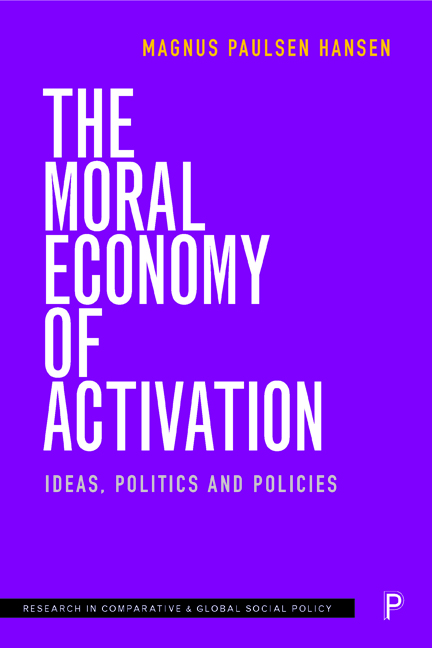2 - Tests, Compromises and Policy Change
Published online by Cambridge University Press: 10 March 2021
Summary
The purpose of this chapter is to develop an analytical model that encapsulates the way political actors justify and criticise policy reforms when they are situated in an arena of coexisting ideas and uncertainty with regard to how to ‘activate’. Further, the analytical model should encompass how these deliberations result in compromises and changes in policies and what the moral consequences of these changes are. Chapter 1 argued that existing theoretical perspectives, from historical institutionalist theories of path dependency to ideational perspectives of discursive institutionalism and governmentality studies, originate in a reality where the legitimation of activation resides in shared and takenfor-granted values, public philosophies, worlds, governmentalities and so on. In the case of historical institutionalism and governmentality studies, they have thus paid little attention to public conflicts, deliberations and legitimation. Discursive institutionalism and discourse analyses do, but in these cases they are presented as an arena for ‘rhetorical strategies’ (Cox, 2001) and ‘weapons of mass persuasion’ (Béland, 2005, p 12) used by ‘framers’ such as ‘spin doctors’ and ‘campaign managers’ (Campbell, 2004, p 103; see also Schmidt, 2006, p 254 onwards). This results in a rather ‘populist’ conception of public deliberation with preference for the ‘heroic’ politics of party leaders and elections and thus a certain neglect, or lack of understanding, of the kind of grey reform politics that is the concern of this book (Panizza and Miorelli, 2013). The following sections show how in French pragmatic sociology (FPS) concepts of tests, justification, critique and compromises propose a different approach that takes public deliberation and legitimisation of ‘grey’ reforms more seriously.
FPS has entered a number of fields, from organisation studies (Jagd, 2011; Patriotta et al, 2011; Dansou and Langley, 2012; Cloutier and Langley, 2013) and international political economy (Ponte and Gibbon, 2005; Cheyns, 2011) to economic sociology (Stark, 2009; Thévenot, 2015), urban studies (Blok and Meilvang, 2014; Holden and Scerri, 2015) and social theory (Honneth, 2010; Delanty, 2011). However, so far few have attempted to introduce FPS to studies in comparative political economy and the political science of legitimation of policy change.
- Type
- Chapter
- Information
- The Moral Economy of ActivationIdeas, Politics and Policies, pp. 21 - 34Publisher: Bristol University PressPrint publication year: 2019



